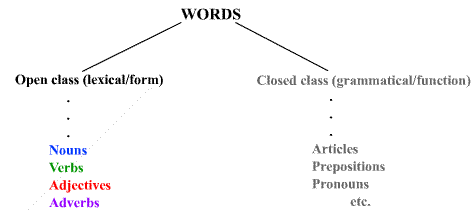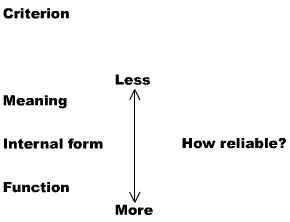
Ling 131: Language & Style
 |
skip
main nav Ling 131: Language & Style |
|
|
Topic 2 (session A) - Being creative with words and phrases > More on word classes |
More on word classesOpen Class (Lexical) Words and Closed Class (Grammatical) WordsWe can make a basic distinction between open class (lexical) and closed class words: 
If we take a sentence like: The mouse dribbled over its cheese. We know that it contains 6 words. But these 6 words belong to two different general types. 'The', 'over' and 'its' are words which indicate grammatical relations mainly, and which belong to small closed classes. This is why words like this are called grammatical, or closed-class words. The definite article 'the' is one of only two articles in English, the other one being the indefinite article 'a', and 'its' is one of a set of seven possessive pronouns. The word 'over' is a preposition, and although there are more than 50 prepositions in English, the set is still very restricted when compared with the thousands of words which constitute the set of nouns in English. 'Mouse' (NOUN), 'dribbled' (VERB) and 'cheese' (NOUN) are members of word classes which are much larger, and indeed are open. You can invent a new noun or verb relatively easily if you feel so inclined, but it is almost impossible to introduce a new pronoun or preposition into English. Open class words are sometimes called lexical or lexically full words, as they carry more 'referential' meaning than the grammatical words. ADJECTIVE and ADVERB are also open word classes. There are thousands of words in each of the open class sets. Try inventing some new words, giving them definitions and comparing them with ours
Defining Open Class WordsWhen defining grammatical categories linguists use three main criteria: meaning, internal form and function (how the category involved functions in the particular grammatical context in which it occurs). The criterion of meaning is the easiest to understand, but as we shall see when we look at nouns, verbs, adjectives and adverbs, it is the least reliable criterion. The most reliable is the criterion of function:

Have a look at the following links for a description of the different (open) word classes:
There are two ways in English to change words from one word-class to another: 1. Attach a derivational affix to the word concerned e.g.:
2. Leave the internal structure of the word alone, but instead change the surrounding grammatical context to force a change of word class. Compare:
In the first sentence 'hit' is a verb, and in the second a noun. This kind of word-class change is sometimes called 'functional conversion' because the grammatical function of the word is changed without any alteration to its internal form. Many word class-shifts have been in the language for a long time and so have become normalised. So, for example, the use of the word 'table' as a verb would not be felt to be unusual at all. And some new uses of words would not necessarily feel very unusual at all. So, if we invent the adjective 'booky', for example (as in 'He is a booky sort of person'), although the word may be a new addition to the list of adjectives in English it does not seem very strange, because it is easy to assign a sensible meaning to it (a 'booky sort of person' could be someone who owns a lot of books, is very interested in books etc., depending on the context that the phrase occurs in). Note, though, that some word-class changes are more peculiar. The asterisked items below seem much more odd than 'booky':
Inventive writers often make words shift from one word class to another for the first time and sometimes the new use will seem very unusual and striking, in which case it often turns out to be significant in terms of textual interpretation. We explore this in more depth in the page which looks at changing word class in this topic session and also in the pages which explore the idea of linguistic deviation in Topic 3 of the course, Patterns, Deviation, Style and Meaning.
|